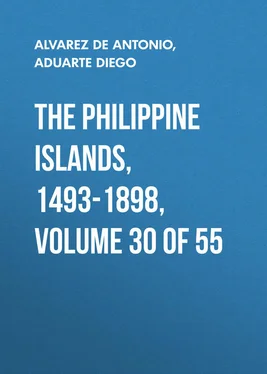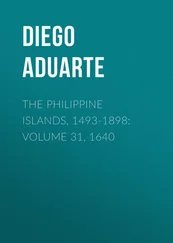Antonio Alvarez de Abreu - The Philippine Islands, 1493-1898, Volume 30 of 55
Здесь есть возможность читать онлайн «Antonio Alvarez de Abreu - The Philippine Islands, 1493-1898, Volume 30 of 55» — ознакомительный отрывок электронной книги совершенно бесплатно, а после прочтения отрывка купить полную версию. В некоторых случаях можно слушать аудио, скачать через торрент в формате fb2 и присутствует краткое содержание. Жанр: foreign_antique, foreign_prose, Историческая проза, на английском языке. Описание произведения, (предисловие) а так же отзывы посетителей доступны на портале библиотеки ЛибКат.
- Название:The Philippine Islands, 1493-1898, Volume 30 of 55
- Автор:
- Жанр:
- Год:неизвестен
- ISBN:нет данных
- Рейтинг книги:4 / 5. Голосов: 1
-
Избранное:Добавить в избранное
- Отзывы:
-
Ваша оценка:
- 80
- 1
- 2
- 3
- 4
- 5
The Philippine Islands, 1493-1898, Volume 30 of 55: краткое содержание, описание и аннотация
Предлагаем к чтению аннотацию, описание, краткое содержание или предисловие (зависит от того, что написал сам автор книги «The Philippine Islands, 1493-1898, Volume 30 of 55»). Если вы не нашли необходимую информацию о книге — напишите в комментариях, мы постараемся отыскать её.
The Philippine Islands, 1493-1898, Volume 30 of 55 — читать онлайн ознакомительный отрывок
Ниже представлен текст книги, разбитый по страницам. Система сохранения места последней прочитанной страницы, позволяет с удобством читать онлайн бесплатно книгу «The Philippine Islands, 1493-1898, Volume 30 of 55», без необходимости каждый раз заново искать на чём Вы остановились. Поставьте закладку, и сможете в любой момент перейти на страницу, на которой закончили чтение.
Интервал:
Закладка:
The Philipinas Islands are absolutely necessary: first, to increase the preaching of the gospel; second, to maintain the authority, grandeur, and reputation of this crown; third, to defend the Moluco Islands and their trade; fourth, to support Eastern India; fifth, to relieve the Western Indias from their enemies; sixth, to aid the two crowns of Castilla and Portugal 2 2 Thus in the original; but in the following expansion of these points eight of them are enumerated, indicating an oversight on the part of the compiler. The sixth is there stated as the renown and profit accruing to the crown from the victories gained by its Philippine subjects; the seventh, the aid given by them to both crowns; the eighth, their protection of Chinese commerce.
in breaking down the power of the Dutch; seventh, to protect for both crowns the commerce of China. In order to support the islands, the commerce with Nueva España is requisite and necessary; for by no other means can their defense, or means for supporting it, be provided. It immediately follows that it is also requisite and necessary to grant this commerce to the islands, or, by abandoning them, to lose all the advantages which result from their preservation, as here represented.
The first proposition of this argument consists of eight fundamental reasons, which are stated therein; but it seems as if they ought to be proved, in order that their force and cogency may be fully understood. Accordingly, I will run through them as briefly as possible.
The first one is the increase of the preaching and promulgation of the holy gospel. This was the principal object which the Catholic sovereigns of Castilla had in carrying on the discovery of the Western Indias, and in colonizing and supporting them – and, consequently, in doing the same for all the islands adjacent to them, among the number of which are the Philipinas; and although the richness of those provinces greatly aided their efforts, this was a secondary object with the sovereigns, and a fulfilment of what is promised in the gospel, that we must seek first the kingdom of God, and that all the rest which the world possesses and esteems shall be gathered and added to us. Therefore, since their intention was the conversion of all the infidels who inhabit that opposite hemisphere, He who became flesh in order to redeem them chose that this undertaking should gain, as a secondary result, the infinite riches which the Indias have given and are giving to España. Such a reason is not lacking in the Philipinas Islands. Their first discovery and settlement were solely for extending the Catholic faith; for then it was not known that those islands would be rich – as indeed they are not of themselves – nor that there could be any further result than the conversion of their natives to the gospel law, and the opening of a gate by which the preaching of the gospel could be carried to other provinces and kingdoms of Asia. That enterprise was prosecuted very successfully, as is publicly known; and it is now very evident that all those islands are today in the bosom of the Church – for they contain an archbishopric and three episcopal sees, and very many convents and hospitals; and there may be seen the Christian religion as pure, as valued, and as venerated as it is in España. And this rouses all the more admiration because the location of the colony is so remote, and so surrounded by heathens, Moors, and heretics; and that, in spite of all, the power and revenues of this crown are able to maintain it. But for this result, which was the main one, what was the second, and in what was seen fulfilled the promise of the gospel? It was, that God has placed in those seas a firm column, on which He could found, and by which they could support themselves, Eastern India, the Molucas Islands, their commerce, and that of China; and which shall prove for the enemies of this crown – heretics, Moors, and heathens – a check upon their advance, a resistance to their intentions, and a strong rock on which they shall be broken, or at least their success may be checked and their machinations prevented. Such are the Philipinas Islands, and this rank they acquired after the preaching of the gospel entered them; and it seems as if it were a providence of Heaven to make them so necessary from the human standpoint, in order that the divine influences might not be lacking in them. For if sometimes the attainment of the first result might not be sufficient for maintaining them (which the piety of the kings of Castilla renders incredible), that of the second result would suffice, because even the divine needs to be maintained in the world by human protection. This is an axiom which, in lands newly converted, is generally accepted in the Indias; and it has been thoroughly proved by experience that the gospel is more effective among the barbarians when it is under the royal banners and standards than when it goes without them. Accordingly, it pleased God to ordain that these standards should be necessary in the Philipinas, in order that the preaching of the gospel, which was the motive for their going thither, might be established in their shelter. It is therefore established by a well-grounded proposition that, even if no more is looked for than this aim of converting the heathen, it is now impossible to give up the preservation of the Philipinas, as being so important a part of the Catholic church. And if the kings of Castilla, in order not to permit liberty of conscience in Flandes, have during more than seventy years maintained in those states (and, through them, in all Europa) the most tedious and costly war that any monarchy in the world has waged: how can it be denied that by abandoning so vast a number of Catholics as there are in those islands, who have been instructed by the Christian zeal of Spaniards, there will, if we leave them now, be introduced among them liberty of conscience? not to mention a mingling of schismatic heretics, Moors, Jews, and heathens of various sects, as is seen in Bantan (which is the Oriental Ginebra [i. e., Geneva]), and in all other places where the Dutch find entrance; and they would soon enter those islands [if we abandon them]. Even if they caused great expenses to this crown (which they do not), they ought to be supported and preserved.
The second reason is, that in these islands are involved the authority, grandeur, and reputation of this crown. [My statement in regard to] the authority is proved by various methods, which may be found in the memorial that I have cited – of which I will only notice here the power which is exercised by the governor who rules the islands in the name of his Majesty. So great is this that it may be affirmed with truth that in all his kingdoms and seigniories (although the viceroyalties are classed as superior to that government) the king does not appoint to an office of greater authority. If this is not evident, let it be noticed how many crowned kings render homage to that governor, and recognize him as their superior; how they respect him and fear his arms; how they desire his friendship, and, if they violate it, receive punishment. The king of Ternate died a prisoner in Manila; and he of Sian made, by force of arms, satisfaction for a reprisal which he had committed. Those of Siao and Tidore are our subjects, and that of Camboxa is our ally. The ruler of Great China is our friend, and the emperor of Japòn was such until the Dutch alienated him; and although the failure of the Japanese trade causes us loss, we have not feared to declare that ruler our enemy – as are those of Champa, Sian, and Mindanao; and, more than all, the Dutch, who keep those seas so infested. And it ought to be considered that the governor of Philipinas sends ambassadors to all those kings, with gifts to present to them, and receives those that they send to him in return; he makes peace and declares war, and does whatever seems to him expedient; and all this on his own responsibility, without waiting for a decision of the matter from España, because the excessive distance renders him the entire master in these acts. This is a preëminence of so great authority that no governor or viceroy in Europe exercises it. The grandeur which this monarchy preserves in those islands is widely known. In its material aspect, that domain extends through a circuit of 1,400 leguas, in which are included the two archipelagos of San Lazaro and Moluco: the latter composed of five especially important islands, which their own kings govern, with more than seventy others adjacent; the latter, of those which are properly called Philipinas, forty in number – some of them larger than all España, some as large as this country, and others somewhat smaller. This does not mention the islands that are small and uninhabited, which are without number. Among all these is [foremost] the island of Luzon, in which is the distinguished and ever loyal city of Manila, which is the precious stone of this setting, and which alone is enough to prove the grandeur of España – by its location, its splendor, its buildings, its sky, and its soil. In its citizens are resplendent the religious faith, the loyalty, and the courage which gave origin to that colony. Since Manila is, as some say, the antipodes of Sevilla, it seems as if it tried to imitate that city in its characteristics, and in being a military center and an emporium of commerce for that hemisphere. If one considers higher things, the power of the islands cannot be reduced to the region just mentioned. Manila may be compared to the city of Goa, the capital of Eastern India; and it is she who reduces to subjection all the coasts from the Straits of Sincapura to Japòn, and the islands of the Ladrones and the Papuas; for her fleets sail through all those seas with the never conquered and always victorious royal standards of España. Her ships are admitted into many maritime kingdoms of Asia, and into numberless islands adjacent to them; they make voyages so long that no others equal to these are known. They go to China and Japòn, and by the Southern Sea to Nueva España; and by way of the Northern Sea – coasting all the Oriental kingdoms, emerging [from the China Sea] through Sincapura, and doubling the great Stormy Cape, that of Buena Esperanza – they have reached the bar of San Lucar, with these two voyages making almost the entire circuit of the world. And if commerce is regarded as the greatest splendor of kingdoms (as it certainly is), this greatness is not lacking to the Philipinas; for they have so rich a commerce that, if they could enjoy it free, there is no city known to the world that would surpass, or even equal, Manila. That in that colony resides and is preserved the reputation of this crown, is evident, if it be noted that the maintenance of that reputation by the arms of España in Fuente-Rabia, in Salsas, in Italia, in Flandes, in Alemania, and in other parts of Europa is not to be wondered at; for if España is the heart which inspires strength in the mystical body of this monarchy, it is not much that the members which are nearest and so closely connected should share most effectively in this influx of energy. And if his Majesty (whom God preserve!) is the soul or vital breath of this heart, it cannot be denied that the closer proximity will cause the greater effect. Besides, the great number of the troops who go out from the adjoining [European] states prevents the enemy from seizing any one of those states; but the greatest cause of reputation for this crown is that, at a distance of three thousand leguas from the royal person and España, three thousand three hundred and thirty-six Spaniards, all of them occupied in those islands in war and in peace, on sea and on land, [accomplish what they do]. It is the citizens of Manila who are the substance of that diamond, where the adjoining states are all enemies – barbarians, heretics, Moors, and heathens. Those Spaniards are without hope of succor in emergencies, without safety for the unfortunate in the retreat, and even without the reward due them for their achievements; they are always inferior in numbers, and continually attacked by Dutch, Mindanaos, Japanese, Jaos, and other peoples. They are always in anxiety about the Chinese, or Sangleys, who number more than 30,000 in Manila; and about the natives, of whom there are more than 80,000. In that land of many islands they maintain fortified posts, and on the sea armed fleets of galleons, galleys, and champans – one for the defense of Manila, another for conveying troops and supplies to Terrenate, and another for the fort on the island of Hermosa. In this last island and in those of Moluco, our military posts confront the Dutch; our people are continually fighting on sea and on land, while they wage on the frontier a fierce war with the most wary people that is known, and with tribes who are as cruel as they can be. Yet, although their soldiers are so few, they meet innumerable obligations, acquit themselves of all, and cause the Spanish name to emerge from all gloriously, and the standards of the king our lord victoriously. Therefore, it is the Philipinas Islands that preserve the reputation of this crown with the most valor and the least reward, with the greatest hazard, and with most glory.
Читать дальшеИнтервал:
Закладка:
Похожие книги на «The Philippine Islands, 1493-1898, Volume 30 of 55»
Представляем Вашему вниманию похожие книги на «The Philippine Islands, 1493-1898, Volume 30 of 55» списком для выбора. Мы отобрали схожую по названию и смыслу литературу в надежде предоставить читателям больше вариантов отыскать новые, интересные, ещё непрочитанные произведения.
Обсуждение, отзывы о книге «The Philippine Islands, 1493-1898, Volume 30 of 55» и просто собственные мнения читателей. Оставьте ваши комментарии, напишите, что Вы думаете о произведении, его смысле или главных героях. Укажите что конкретно понравилось, а что нет, и почему Вы так считаете.












